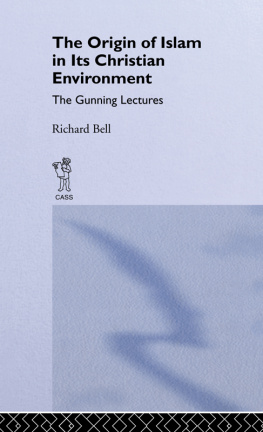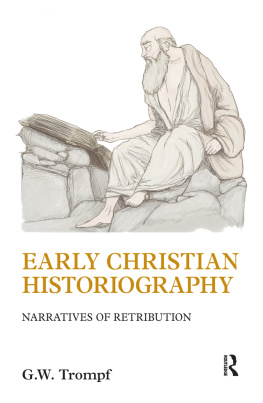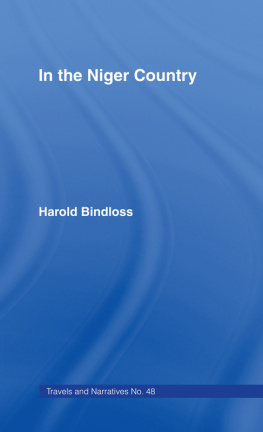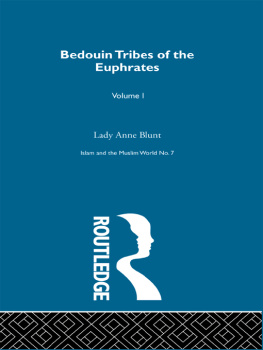ISLAM AND THE MUSLIM WORLD
No. 10
General Editor: JOHN RALPH WILLIS
Centre of West African Studies, University of Birmingham
THE ORIGIN OF ISLAM
IN ITS
CHRISTIAN ENVIRONMENT
THE ORIGIN OF ISLAM
IN ITS
CHRISTIAN ENVIRONMENT
THE GUNNING LECTURES
EDINBURGH UNIVERSITY, 1925
BY
RICHARD BELL

This impression first published by
FRANK CASS AND COMPANY LIMITED
The edition published by Routledge-2012
2 Park Square, Milton Park, Abingdon, Oxon, OX14 4RN
711 Third Avenue, New York, NY 10017
Routledge is an imprint of the Taylor & Francis Group, an informa business
First edition | 1926 |
New impression | 1968 |
Transferred to Digital Printing 2005
ISBN: 978-0-714-61977-4 (hbk)
ISBN: 978-1-136-26074-2 (ebk)
Preface
THIS book was prepared as lectures to be given on the Gunning Foundation in connection with the Divinity Hall of Edinburgh University. As actually delivered in the spring of this year the lectures had to be severely compressed. They are now printed in the form in which they were written. I am indebted to the Faculty of Divinity for the opportunity of treating a subject in which I have long been interested. A special word of thanks is due to Professor A. R. S. Kennedy, D.D., to whose teaching, advice and encouragement I owe much. One of the objects of the Gunning Bequest is to bring out among ministers the fruits of study in Science, Philosophy, Language, Antiquity, and Sociology. If any restriction is implied in that wide definition it is that the subject of study should not be directly theological. The primary interest of these lectures is historical. The aim has been to present the origin of Islam against a background of surrounding Christianity. In some ways that point of view has proved more fruitful than I had expected. Instead of discovering, as I set out to discover, what was the nature of the contact which Muhammad had had with Christianity before he began the composition of the Qurn, I found that the Qurn itself contains the record of his efforts to reach a meagre knowledge of the great religion which surrounded Arabia, and that the recognition of this leads, as I believe, to the explanation of one or two things in the Qurn and in the Prophets career which have hitherto been obscure. The Qurn having thus developed unexpected interest, has occupied more space than I had originally designed to give it. In quoting from it, I have in some passages, particularly those from the earlier surahs, given my own interpretation of the Arabic; in others the rendering of Rodwell or of Sale has been adopted.
The transliteration of Arabic names is always a difficulty. I have not sought to be pedantically accurate, but have been content to adopt forms already current in English, or to represent the Arabic spelling by the nearest equivalent in Roman characters. Diacritical points have, however, sometimes been used. Any inconsistencies which have thus crept in will not, I hope, be found confusing. Where an Arabic word or phrase has had to be discussed, I have aimed at greater accuracy in transliteration.
I have tried not to overload the text with footnotes; and while I hope the essential references are given, I have omitted to refer to many books from which I have received help.
RICHARD BELL.
November 1925.
Lecture I
The Eastern Church and The Christian Environment of Arabia
FROM one point of view the triumph of Islam in the East in the seventh century A.D. may be regarded as the judgement of history upon a degenerate Christianity. The degeneration of the Church may be said to have begun in the fourth century. The seeds of it were present earlier, but they could not well develop in a persecuted Church. When the Church was freed from the danger of persecution by the accession of Constantine, they began to develop rapidly. To my mind the evil was not, as is often held, the alliance of the Church with the State, or at any rate not that in itself. True, the fact that Christianity became then the recognised and prevailing religion, brought worldliness into the Church. That would probably have happened apart from any relation to the State so soon as Christianity ceased to be persecuted as such, and by its own success became fashionable. It is true too that ultimately the alliance of Church and State became so close that the bishops and other high dignitaries of the Church became, in a manner, State officials. So much was the Church a part of the Roman Empire, that the acceptance of Christianity was regarded as a sign of subserviency to the latter. That fact is not without its significance in trying to realise conditions in Arabia in the time of Muhammad. It helps to explain the readiness with which even Christian Arabs accepted an independent Arabian prophet. It also no doubt played a part in forming Muhammads ideas of what religion was. If we sometimes feel ourselves brought up with a shock against the fact that Islam is apparently in curably political, is, as we say, not only a religion but a state, we must remember that that was what Muhammad saw in Christianity, and also what he gathered from the Old Testament.
From the beginning of the fourth century the Church was troubled by doctrinal disputes. The Arian controversy was already raging when Constantine became sole emperor. One of his first acts was to summon the Council of Nica for the purpose of pacifying and reuniting the Church. Under the influence of the profound intellect and strong personality of Athanasius it resulted in the proclamation of the Homoousion. Some have deplored that the faith of the Church was thus wedded to philosophy, and that the way was opened to the intellectual speculation which transformed the simple gospel of divine love into a dogmatic system which appealed to the mind rather than to the heart. But the intellectual interpretation and justification of its faith is a task which the Church can never avoid. Intellectual speculation had very early begun to
The decision of Nica did not settle the question. A period of acute controversy followed. Other questions also pressed for solution. The Holy Spirit was readily admitted to be likewise of one substance with the Father. But what was the relation between the three Persons? The worship of three separate divine entities being inadmissible, what distinctions in the Godhead did the facts of Christ and the Holy Spirit imply? That was the form in which the problem of reaching an adequate conception of God presented itself to the Christian thinkers of the fourth century. On the other hand, if God was incarnate in Jesus Christ, what was the relation between the divine and the human in Him? That question, which really involves the problem of the nature of human personality in which the present day is so much interested, was even more fruitful of controversy than the other. Throughout the fifth and sixth centuries it disturbed the Church.
In the mazes of these intellectual and philosophical problems the Eastern Church lost itself. It was rent by internal strife and patent schism. It lost the fine edge of its religious feeling and the concentration of its moral energy. That in spite of its intellectual superiority it was weak in moral and religious insight, when called upon to meet the onslaught of Islam the treatment of that religion by John of Damascus furnishes proof. He regards it simply as a kind of bastard Christianity, which is sufficiently refuted by the absurdities contained in the Qurn, and the defects of its intellectual conception of God. For the dynamic force and moral passion of this new religion which was conquering the world around him he has no eyes at all.
Next page






